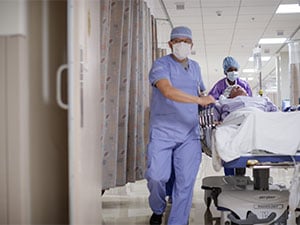Anal Cancer Information

Anal cancer is a condition in which malignant (cancerous) cells divide and grow uncontrollably in the tissues of the anus and anal canal. Located at the end of the large intestine below the rectum, the anus is the structure through which solid waste is eliminated. Anal cancer is relatively rare—much rarer than cancers of the colon or rectum—and most often affects older adults.
The majority of anal cancers develop in the mucosa, or the inner lining of the anal canal. This area is about an inch and a half long and connects the rectum to the anal verge, where the anal canal meets the external skin of the anus. Many different tumors can occur in the anus and anal canal, including benign (noncancerous) growths that may develop into cancer over time.
Contact us today to schedule an appointment. Call us at 1-888-663-3488 or request an appointment online.
Causes of anal cancer
Anal cancer has a significant link to the human papillomavirus (HPV). However, having an HPV infection does not necessarily mean a person is certain to develop anal cancer. The same can be said for other established risk factors for anal cancer, which include:
- Having a human immunodeficiency virus (HIV) infection
- Being 50 or older
- Engaging in anal sex as the receiving partner (this is true for males and females)
- Having an impaired immune system
- Smoking cigarettes or using other tobacco products
- Having an anal fistula
Anyone can develop anal cancer, but individuals who have one or more risk factors should be particularly mindful of potential symptoms and promptly speak with a medical professional should they occur.
Anal cancer symptoms
The signs of anal cancer can vary from person to person—some people never experience obvious symptoms. In most cases, though, symptoms involve one or more of the following:
- Rectal bleeding, especially during bowel movements
- Changes in bowel habits
- Anal pain or pressure
- Unusually thin stools
- A lump near the anus
- Anal discharge or leaking stool
- Itching around the anus
- A frequent need to have a bowel movement
Anal cancer shares many symptoms with several less-serious conditions that are significantly more common, such as irritable bowel syndrome (IBS) and hemorrhoids.
Anal cancer treatment options
 Anal cancer is highly treatable when it is found in an early stage. Each patient’s ideal course of treatment will depend on several factors—most notably, the size of the anal tumor and whether it has spread to other parts of the body—in addition to the person’s age and overall health. In many cases, people with anal cancer live long and healthy lives.
Anal cancer is highly treatable when it is found in an early stage. Each patient’s ideal course of treatment will depend on several factors—most notably, the size of the anal tumor and whether it has spread to other parts of the body—in addition to the person’s age and overall health. In many cases, people with anal cancer live long and healthy lives.
Common treatment approaches for anal cancer include:
Surgery
Local resection surgery is often the recommended form of treatment for early-stage cancers and tumors in the lower part of the anus. During the procedure, the anal tumor is removed along with a small margin of healthy surrounding tissue.
Abdominoperineal (AP) resection surgery may be performed in patients with late-stage anal tumors or those who don’t improve with other forms of treatment. This operation involves removing the lower section of the gastrointestinal tract.
Chemotherapy
Chemotherapy involves administering powerful medications that attack cancer cells. These medications can be given orally or intravenously, or through an injection into a muscle.
Radiation therapy
Radiation therapy uses high-energy X-rays to kill cancer cells. During this noninvasive treatment, X-ray beams are precisely administered to a certain area to attack cancer cells and help shrink tumors.
The anal cancer doctors at Moffitt Cancer Center
Moffitt Cancer Center’s Gastrointestinal Oncology Program takes a unique, multispecialty approach to treating anal cancer. Our team includes specialists from diverse medical backgrounds who collaborate to develop an individualized treatment plan for every patient, meeting routinely to update and refine each plan as necessary. Moffitt’s anal cancer treatment team comprises:
- Surgeons
- Medical oncologists
- Radiation oncologists
- Interventional oncologists
- Endoscopy specialists
- Radiologists
- Pathologists
- Supportive care specialists
Our specialists possess extensive experience in treating even the most uncommon types of anal cancer and identifying what strategies work best given the health and age of the patient, the dynamics of the individual tumor and other key variables. Additionally, Moffitt’s physician-scientists work diligently to improve treatment options and prevent cancer recurrence through ambitious research initiatives and a robust clinical trial program. For these reasons and more, Moffitt has been named a Comprehensive Cancer Center by the National Cancer Institute. We are currently the only Florida-based cancer center to hold this designation.
To learn more about Moffitt’s approach to anal cancer or request an appointment, call 1-888-663-3488 or submit a new patient registration form online. As Florida’s top cancer hospital, Moffitt provides rapid access to world-class cancer care.
Support the Future of Gastrointestinal Oncology Research and Treatment
When you support Moffitt Cancer Center, you help make breakthrough gastrointestinal research and innovative treatments possible.
Give now to support the Gastrointestinal Oncology Program. For more information, call toll-free 1-800-456-3434, ext. 1403.
